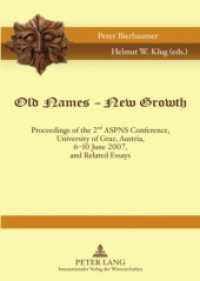Full Description
This book examines the processes through which children effectively 'inherit' their position in the social world.
It asks:
How does class inequality affect one of the most formative periods in human development, that is, early childhood?
When do differences in class background manifest themselves in children's actions and attitudes?
How do class divisions intersect with racial and gender inequality to shape the way that children navigate the social world?
When do children become aware of the fact that 'inequality' is a key feature of their lifeworld?
Bringing together original research from France, Norway, Sweden, Belgium and the USA, this book unravels the ways in which class inequality shapes our earliest experiences of the social world. It will appeal to scholars and students interested in class and social stratification, the sociology of childhood and family, cultural sociology, sociolinguistics, child and developmental psychology and educational science.
Contents
Introduction: Studying Class in Early Childhood. A Field in its Infancy?; PART I: Family Dynamics and the Early Transmission of Class Privilege; 1. Organized Lifestyles in Childhood and Family Climate; 2. Different Spheres: Children's Worlds, Adult Worlds, Tara Carroll; 3. Outside of Family Care. Socialization of Orphans and Transmission of Capital in the French Child Welfare System; 4. 'You're Not my Mom!'. Legitimacy of Socialization Agents and Social Belonging of Foster Children; PART II: The (Pre)School Reproduction of Inequality; 5. A Fair Start? The Social Segregation of Early Childhood through Preschool Choice; 6. Preserving childhood or moving towards adulthood? Patterns of Socialization and construction of inequalities at age; 7. The transmission of international cultural capital in upper middle class families during childhood; PART III: Language, Socialisation and Symbolic Power; 8. Taking the Reins: Social Class Differences in Language Socialization among Siblings; 9. All Roads Lead to Male Domination? The Case of Théodore, a Young Upper Middle-Class Child; 10. The Genesis of Certitudo Sui. How Childhood Socialisation Constructs Social Ease and Reserve; PART IV: Constructing Children's Social Sense; 11. When Do Children Start to Grasp 'Class', 'Status' and 'Inequality'? A Review of the Literature; 12. How Children Perceive Economic Inequality: Results of an Analysis of Drawings with 7 and 8-year-olds; 13. Symbolic Recycling: How Social Class Comes to Children's Minds








